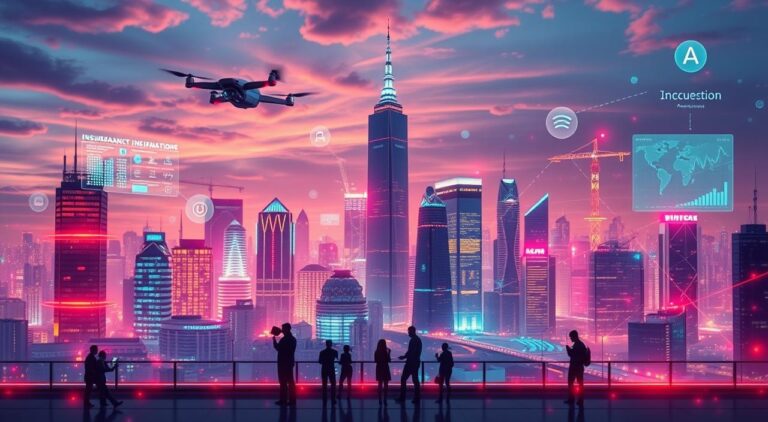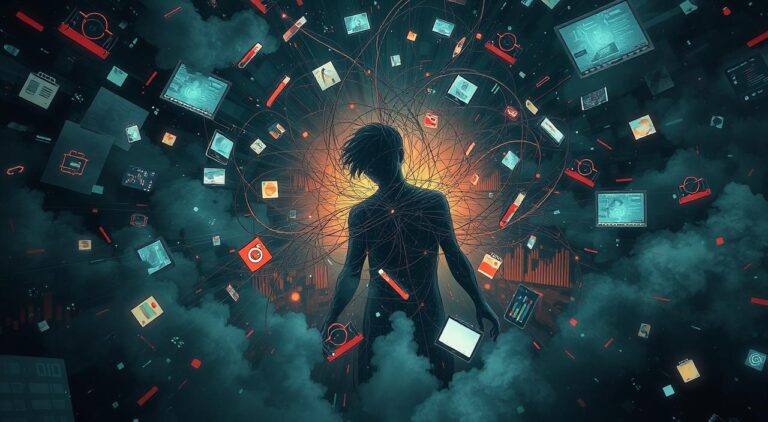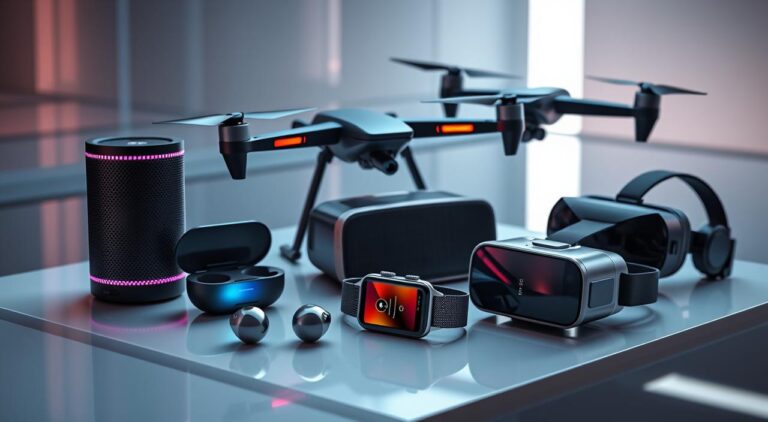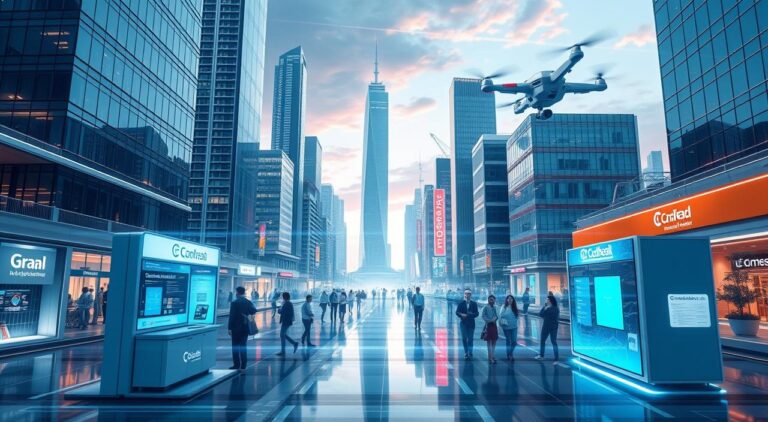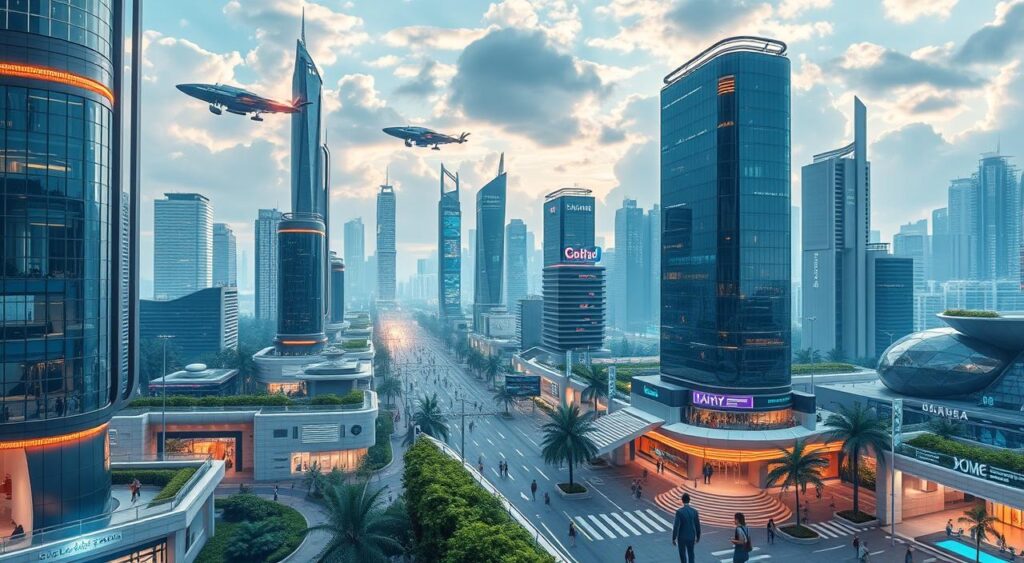
In our fast-changing world, the role of technology is a big topic of discussion. From the first stone tools to today’s advanced digital tech, tech has greatly changed our society. It drives progress and innovation. But what is technology’s true purpose, and how does it affect our lives, work, and future?
We will dive into the world of technology, looking at its definition, growth, and main parts. We’ll see how it changes how we talk, work, and live in the digital age. Join us as we explore technology’s many roles in our lives and the ethical and future trends that will shape tech tomorrow.
Key Takeaways
- Technology is the use of knowledge to solve problems in a way that can be repeated.
- Technological advancements have brought big changes, from the wheel to today’s digital tech.
- Technology helps the economy grow and improves our lives, but it can also have downsides.
- The main goal of technology is to make our lives better, more efficient, and innovative.
- Knowing about technology’s history and parts is key to understanding its big impact on us.
Understanding Technology: Definition and Evolution
Technology has been changing since the 1600s. It comes from the Greek words “Téchnē” and “-logía.” “Téchnē” means “craft” or “art,” and “-logía” means “study” or “knowledge.” Today, technology is about using knowledge to solve problems and improve our lives.
Early Development and Historical Context
The start of technology’s growth is tied to the Neolithic Revolution. This was when people moved from hunting and gathering to farming. The wheel was invented around 5,500 to 3,000 BCE in places like Mesopotamia and Europe.
As societies grew, so did technology. The printing press and steam power were big steps forward. Each step has helped us move forward in amazing ways.
Key Components of Modern Technology
Now, technology includes many things like computers, software, and networks. These help us process information and share ideas. They make our digital world more connected and efficient.
Technology as a Human Innovation
Technology shows our ability to solve problems and create. It’s a result of our collective brainpower and curiosity. As we keep exploring, technology will help shape our future.
“Technology is a word that describes something that doesn’t work yet.” – Douglas Adams
What is the Main Purpose of Technology?
Technology has changed how we live, work, and interact. Its main goal is to solve problems and improve our abilities. It helps us work better, communicate more easily, and advance in many areas of society.
At its heart, technology aims to make our lives easier and more productive. It automates tasks and gives us quick access to information. This makes our daily tasks more efficient and precise.
Technology’s impact is huge, affecting every part of our lives. It has changed how we talk, work together, and learn. It boosts the economy by helping businesses grow and innovate quickly. In schools, it makes learning more fun and interactive for students.
But technology’s role goes beyond just making things easier. It also helps solve big global problems like environmental issues and health challenges. By using technology, we can find solutions to complex issues and improve life for everyone.
In the end, technology’s main goal is to make our lives better. It connects us, makes us more efficient, and enriches our experiences. As we keep innovating, technology’s potential to change the world is endless.
The Transformation of Society Through Technological Advancement
Technological advancements have changed our society, especially in communication and connectivity. The invention of key technologies like the printing press, telephone, and internet has made sharing knowledge easier. Now, we can talk and share information in real-time all over the world.
Impact on Communication and Connectivity
Digital communication platforms and social media have changed how we talk to each other. Cloud computing services like Google Drive and Dropbox have made sharing and working together online easier. These changes have made our world more connected, affecting how we work, socialize, and access information.
Economic and Industrial Revolution
The Industrial Revolution was a big change in human history, changing how we work and make money. New technologies in making things, moving goods, and using energy made us more productive and wealthy. But, these changes also made some people poorer and jobs harder to find, problems we still face today.
Digital Age and Information Access
The Digital Age has brought us a world where information is key. The internet and digital tech have led to new terms like “post-industrial society” and “information age.” By 2012, almost all information was digital, showing how fast information has grown and changed our world.
As technology keeps changing our world, we must find a way to use it wisely. We need to solve the problems it brings and use its benefits to make our future better and fairer.
Essential Functions of Technology in Daily Life
Technology is now a big part of our daily lives. It changes how we talk, work, learn, and have fun. Cloud computing helps us store and manage data easily. Network security tools like VPNs and anti-virus software protect our information.
In schools, learning management systems like Canvas have changed how we study. These systems make online learning easy. Students and teachers can work together, get course materials, and stay in touch from home. IT support teams can now fix problems from anywhere, keeping our devices and systems safe.
Smartphones and smart home devices are very important to us. They make our lives easier and more connected. These innovative tools let us control our homes, talk to family, and find lots of information quickly.
| Technology Application | Key Benefits |
|---|---|
| Cloud Computing Services | Seamless data storage and management |
| Network Security Tools | Protecting personal and business information |
| Remote Device Troubleshooting | Enabling IT support to resolve issues from anywhere |
| Learning Management Systems | Facilitating online learning and student-teacher interactions |
| Smartphones and Smart Home Devices | Enhancing convenience and connectivity in everyday activities |
As technology keeps getting better, it plays a bigger role in our lives. It helps us work better, be more efficient, and enjoy a better quality of life.
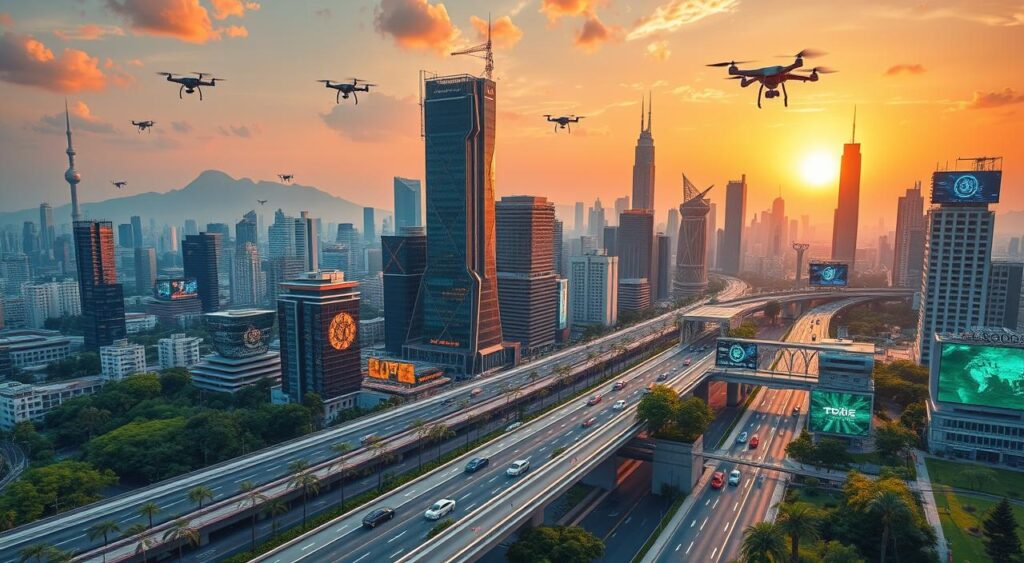
Technology’s Role in Business and Industry
In today’s world, technology is key to business growth. It helps companies work better and stay ahead. Let’s see how tech is changing industries and businesses.
Digital Transformation in the Workplace
Companies that don’t use new tech will fall behind. The right tech can make operations smoother and decisions smarter. For example, automation cuts down on manual work, saving time.
Tools like video calls and project software make teamwork easier. But, adopting new tech and overcoming resistance can be tough.
Automation and Efficiency
Automation makes businesses more efficient. It lets workers focus on creative tasks. This boosts productivity and cuts down on mistakes.
AI chatbots offer 24/7 customer service, improving satisfaction. New supply chain tech optimizes logistics and inventory. These changes make operations smoother.
Innovation and Competitive Advantage
Technology drives innovation, keeping businesses competitive. It includes AR for better customer experiences and AI for smarter planning. These tools give companies an edge.
New tech like quantum computing will change the business world even more. By embracing digital transformation, innovation, and progress, companies can thrive in a tough market.
| Technology Trend | Impact on Business |
|---|---|
| Automation | – Increased productivity and efficiency – Reduced errors and streamlined operations – Improved customer service through AI-powered chatbots |
| Data Analytics | – Gather valuable insights for data-driven decision making – Track sales performance and optimize marketing strategies – Enhance supply chain and inventory management |
| Emerging Technologies | – Augmented reality (AR) for improved customer engagement – Quantum computing and spatial computing for new growth opportunities – Blockchain and zero-trust architecture (ZTA) for enhanced cybersecurity |
By using digital transformation, businesses can achieve more. They gain efficiency, innovation, and progress. This helps them stand out globally.
The Impact of Technology on Education and Learning
Technology has changed education a lot. It has brought in e-learning, digital tools, and more. These changes have made learning different and better.
Systems like Canvas make it easy to manage classes and grades. They help teachers and students work together better. Tools like Google Apps for Education also help with teamwork and sharing ideas.
Now, learning can happen anywhere, not just in school. This means more people can learn, no matter where they are. Learning materials are now interactive and fit each student’s needs.
| Key Statistic | Impact |
|---|---|
| 92 percent of teachers understand the impact of technology in education. | Educators recognize the transformative potential of technological advancements in the classroom. |
| 59 percent of middle school students state that digital educational tools have helped them improve their grades and test scores. | Technology-enabled learning enhances academic performance and engagement for students. |
| The educational technology market is projected to expand to $342 billion by 2025. | Significant investment and growth in the sector signify the increasing adoption and integration of technology in education. |
But, technology in schools also has its challenges. It can be hard for teachers in some places. Also, studies show that learning is better with a teacher’s help.
Yet, technology will keep changing education. We will see more new ways to learn and work together in a tech world.
“Flexible approaches are deemed as critical during challenging times for educational institutions.”
Ethical Considerations and Challenges
Technology is growing fast, and we must think about its ethics and impact. Privacy and security are key, as companies collect a lot of personal data. If not handled right, this data can lead to big problems.
Privacy and Security Concerns
Using personal info for profit is a big worry. Companies use data in ways that might not be right. Misinformation and fake tech also affect the world, showing we need to be careful with tech.
Environmental Impact
Technology’s effect on the planet is another big issue. Things like e-waste and energy use are important. We need to make sure our tech doesn’t harm the Earth.
Social Implications
Technology changes how we interact and work. It can widen the digital gap and lead to job losses. Finding a balance between tech progress and ethics is hard.
To tackle these issues, companies should check for risks and make rules for data safety. They should also teach their teams to be responsible. Talking openly and regularly helps make sure tech is good for everyone.
| Ethical Concern | Description | Potential Impact |
|---|---|---|
| Misuse of Personal Data | Businesses gather vast amounts of personal data, which can lead to breaches of privacy and cyberattacks. | Violation of individual privacy, financial and identity theft, and loss of trust in technology companies. |
| Spread of Misinformation | The availability of real-time information on the internet can easily be misinterpreted or spread without fact-checking. | Manipulation of public opinion, undermining of democratic processes, and erosion of trust in information sources. |
| Lack of Accountability | Confusion arises regarding data governance responsibilities when multiple parties are involved in technology operations. | Difficulty in identifying and addressing ethical breaches, leading to a lack of transparency and trust in technology companies. |
| Liability for Autonomous Technology | Autonomous technologies like self-driving cars raise concerns about human intervention for safety and ethical purposes. | Potential for accidents and loss of life, uncertainty about legal and moral responsibilities, and public hesitancy in adopting autonomous technologies. |
| Artificial Intelligence (AI) Bias and Accountability | AI technologies have the potential for misuse due to personal data exposure and inherent biases in the training datasets. | Discrimination, perpetuation of societal biases, and lack of transparency in AI-driven decision-making processes. |
By tackling these ethical issues, we can make sure tech improves our lives. It should respect our privacy, protect the environment, and make society fairer and more inclusive.
Future Trends and Emerging Technologies
Technology is on the verge of a big change. New technologies are changing how we live and work. This includes AI, machine learning, IoT, and quantum computing.
AI is getting better fast, especially with generative AI. These systems can make complex content. They’re changing media, entertainment, and customer service.
Quantum computing is also making waves. It can process information much faster. This will change fields like cryptography and drug discovery.
5G technology is making data speeds and connections better. This means more use of IoT, AR, and self-driving cars. They will change our daily lives.
In healthcare, we’re seeing more personalized care. Wearable health monitors and biotechnology are improving farming. They help grow crops that are better and last longer.
Green energy is becoming more important. We’re moving towards cleaner, cheaper energy sources. XR is also changing healthcare and aviation with immersive training.
As tech grows, so does the need for IT experts. The U.S. Bureau of Labor Statistics says IT jobs will grow 15% by 2031. Skills in programming and security are key.
Keeping up with new tech is vital. It helps us stay ahead in a changing world. By embracing innovation, we can create a bright future.
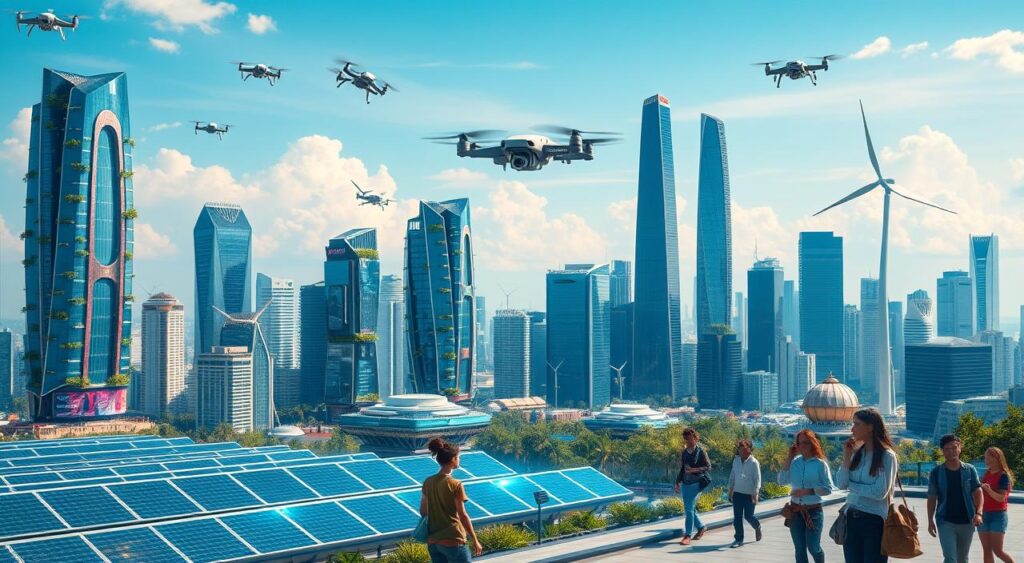
“The future belongs to those who believe in the beauty of their dreams.”
– Eleanor Roosevelt
Conclusion
Technology’s main goal is to improve our abilities and solve big problems. It has changed how we live and work since the first stone tools. Today, digital systems are leading the way.
But, technology also brings challenges. We need to think carefully about how to use it right. This is key for a better future.
Looking ahead, using technology wisely is vital. It’s helping with cell phones, solar power, and green cars. These are steps towards a better world.
We must find a balance between technology’s good and its challenges. This includes privacy, security, and how it affects our planet. By doing this, technology can truly help us and our world.

